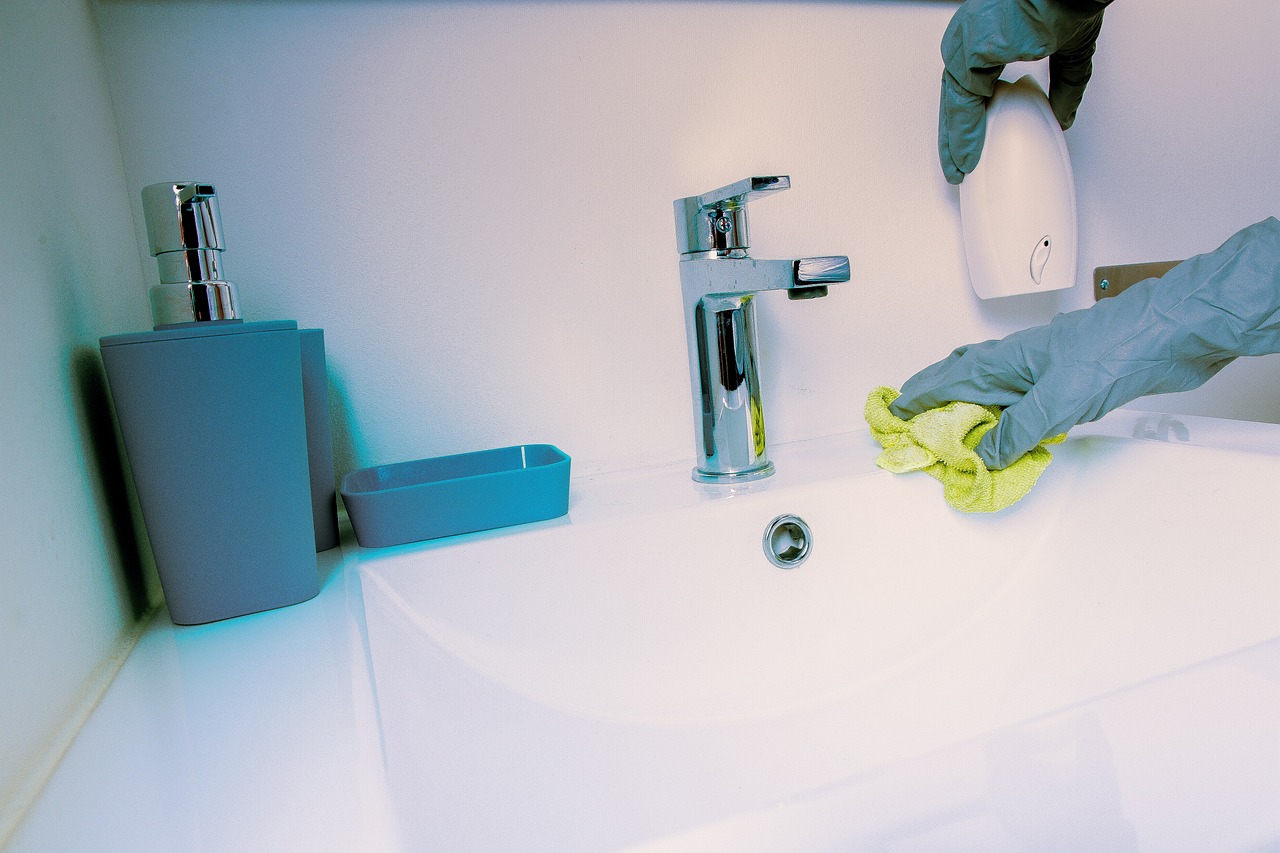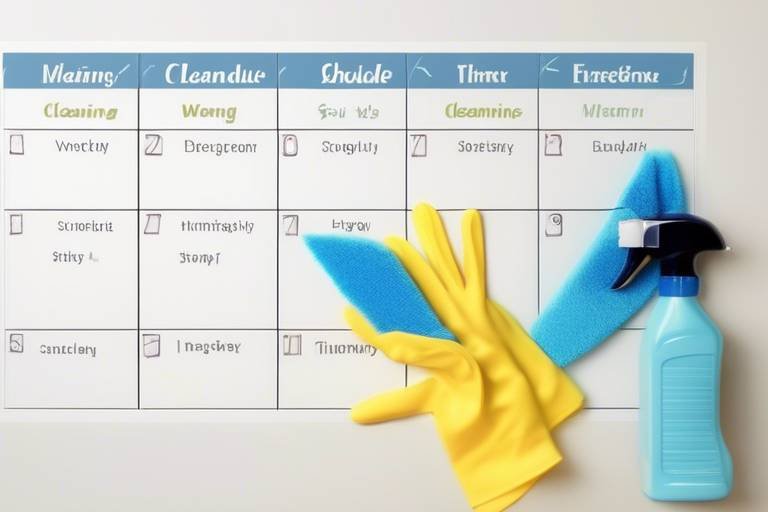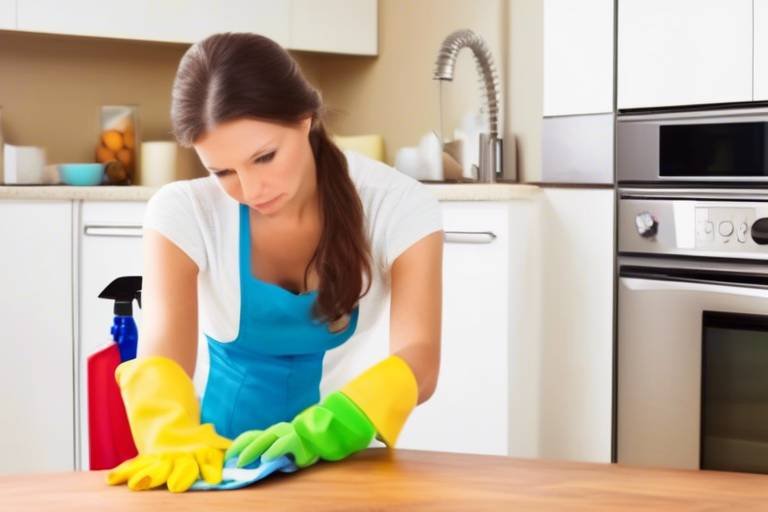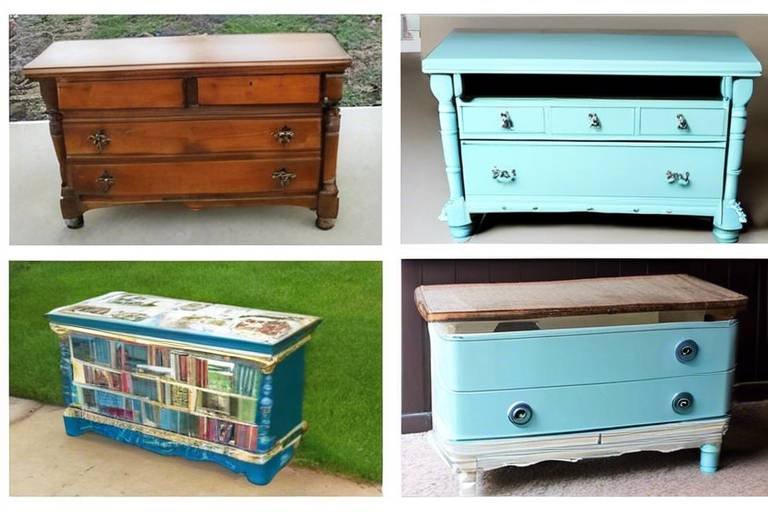How to Create an Efficient Cleaning Schedule
Maintaining a clean and organized space is crucial for both productivity and overall well-being. A well-thought-out cleaning schedule can make all the difference in ensuring that your home or workplace remains tidy and welcoming at all times.
When it comes to creating an efficient cleaning schedule, the first step is to assess your specific cleaning needs. Consider the size of your space, the number of rooms, and the unique cleaning requirements for each area. This initial analysis will help you determine the frequency and intensity of cleaning tasks required.
Setting realistic goals is key to a successful cleaning schedule. Take into account your daily schedule and lifestyle to establish achievable cleaning goals. By prioritizing tasks and considering your commitments, you can ensure that your cleaning routine is manageable and sustainable in the long run.
It's essential to allocate your cleaning time wisely. Divide your tasks into daily, weekly, and monthly categories, and assign specific time slots for each task. Balancing quick daily maintenance with more thorough weekly cleanings can help prevent the accumulation of dirt and clutter.
Creating a detailed checklist is a valuable tool in staying organized and on track with your cleaning routine. Outline all the cleaning tasks required for each room or area, ensuring that no task is overlooked. A checklist can also help you track your progress and maintain consistency in your cleaning efforts.
Don't hesitate to delegate responsibilities if you share your living or working space with others. Involving family members, roommates, or colleagues in the cleaning process can help distribute the workload and maintain a clean environment collectively. Assigning specific tasks can make the cleaning process more efficient and collaborative.
Investing in high-quality cleaning tools and supplies is another essential aspect of creating an efficient cleaning schedule. Having the right equipment for different surfaces and areas can make your cleaning tasks more effective and save you time and effort in the long term. Choose tools that are suitable for your specific cleaning needs.
Establishing a consistent cleaning routine is crucial. Make cleaning a habit by integrating it into your daily or weekly activities. By following your schedule diligently, cleaning will become a natural part of your routine, ensuring that your space remains clean and organized without feeling like a burden.
Regularly review and adjust your cleaning schedule to ensure its effectiveness. Evaluate the frequency and intensity of tasks based on changing circumstances or feedback. By adapting your cleaning routine to meet your evolving needs, you can maintain a clean and organized environment effectively.

Assess Your Cleaning Needs
Maintaining a clean and organized space is essential for productivity and well-being. Learn how to create a cleaning schedule that works for you, ensuring your home or workplace stays tidy and welcoming at all times.
Analyzing your cleaning needs is the first crucial step in creating an efficient cleaning schedule. Consider the size of your space, the number of rooms, and the specific cleaning requirements for each area. By understanding the unique demands of your environment, you can tailor your cleaning routine to address them effectively.
Assessing your cleaning needs also involves evaluating the frequency at which different areas require cleaning. For example, high-traffic areas such as the living room or kitchen may need daily attention, while guest bedrooms could be cleaned less frequently. By identifying these patterns, you can allocate your time and resources more efficiently.
Furthermore, take into account any specific cleaning challenges or preferences you may have. Are there certain tasks that you find particularly time-consuming or difficult? Do you have any sensitivities to certain cleaning products? By acknowledging these factors, you can streamline your cleaning process and make it more manageable.
Creating a visual representation of your space, such as a floor plan or room layout, can also help you assess your cleaning needs more effectively. This can aid in identifying areas that are often overlooked or require specialized cleaning techniques.
In summary, assessing your cleaning needs involves a comprehensive evaluation of your space, cleaning requirements, frequency of cleaning, challenges, preferences, and visual representation of the area. By gaining a clear understanding of these factors, you can develop a tailored cleaning schedule that meets your specific needs.

Set Realistic Goals
Setting realistic goals is a crucial step in creating an efficient cleaning schedule. It's like embarking on a journey; you need to know your destination before planning the route. Consider your daily routine, work schedule, and personal commitments when setting cleaning goals. Are you a busy professional with limited time, or do you have more flexibility in your schedule? Tailor your cleaning goals to fit your lifestyle to ensure they are achievable and sustainable in the long run.
Think of setting realistic goals as planting seeds in a garden. You want to nurture and grow your cleaning habits gradually, rather than overwhelming yourself with unattainable tasks. Start small by focusing on key areas that require regular maintenance, then expand your goals as you become more comfortable with your cleaning routine. By setting achievable goals, you set yourself up for success and avoid feeling discouraged or burnt out.
Creating a balance between ambition and practicality is key to setting realistic goals. Imagine you're building a house; you need a solid foundation to support your cleaning schedule. Prioritize tasks based on importance and urgency, allocating time and energy where it matters most. By breaking down your cleaning goals into manageable steps, you can track your progress effectively and stay motivated to keep up with your routine.
Consider your cleaning goals as a roadmap to a cleaner and more organized space. Just like planning a road trip, you need to map out your route and milestones along the way. Set specific targets for daily, weekly, and monthly tasks, ensuring that you have a clear direction to follow. By setting realistic goals, you not only create a structured cleaning schedule but also set yourself up for long-term success in maintaining a tidy environment.

Allocate Time Wisely
When it comes to keeping your space clean and organized, time allocation plays a crucial role in ensuring efficiency. By dividing your cleaning tasks into daily, weekly, and monthly categories, you can effectively manage your time and maintain a tidy environment without feeling overwhelmed. Consider designating specific time slots for each task, balancing quick daily maintenance with more thorough weekly cleanings to prevent the accumulation of dirt and clutter.
Think of your cleaning schedule as a carefully orchestrated symphony, where each task has its designated time to shine. Just like a conductor guides the musicians to create a harmonious melody, allocating time wisely for your cleaning routine will help you orchestrate a clean and welcoming space.

Create a Checklist
Creating a checklist is a crucial step in ensuring that all cleaning tasks are completed efficiently and effectively. A well-organized checklist helps you stay on track, maintain consistency, and avoid overlooking any important tasks. Start by listing all the cleaning tasks required for each room or area in your space. Break down the tasks into categories such as daily, weekly, and monthly chores to ensure that nothing is missed. Consider including specific details for each task, such as the tools and supplies needed, to streamline your cleaning process.
In addition to listing the tasks, prioritize them based on importance and frequency. Focus on high-traffic areas or tasks that require immediate attention to create a functional cleaning schedule. By categorizing tasks and setting priorities, you can efficiently allocate your time and resources to tackle the most critical cleaning duties first. This approach helps prevent procrastination and ensures that essential cleaning tasks are completed in a timely manner.
Consider using a digital checklist or a printable template to keep track of your cleaning progress. Having a visual representation of your tasks can help you monitor your accomplishments, identify areas that may need extra attention, and motivate you to stay consistent with your cleaning routine. Update your checklist regularly to reflect any changes in your cleaning needs or priorities, ensuring that it remains a useful tool for maintaining a clean and organized space.

Delegate Responsibilities
When it comes to maintaining a clean and organized space, delegating responsibilities can significantly lighten the cleaning load and promote a sense of shared ownership. By involving family members, roommates, or colleagues in the cleaning process, you can distribute tasks more efficiently and ensure that everyone contributes to maintaining a tidy environment.
Delegate responsibilities by assigning specific cleaning tasks to each individual based on their preferences, strengths, and availability. For example, someone might excel at vacuuming, while another person is great at organizing clutter. By leveraging everyone's skills and interests, you can create a more effective and harmonious cleaning routine.
Communication is key when delegating responsibilities. Clearly outline expectations, deadlines, and standards for cleaning tasks to avoid misunderstandings and ensure accountability. Regular check-ins and feedback sessions can help address any issues or concerns that may arise during the cleaning process.
Consider creating a shared cleaning schedule or chore chart that clearly outlines each person's responsibilities and the frequency of tasks. This visual representation can help everyone stay on track and understand their role in maintaining the cleanliness of the space.

Use Efficient Cleaning Tools
When it comes to maintaining a clean and organized space, having the right cleaning tools is essential for efficiency and effectiveness. Imagine trying to clean a carpet with a broom or scrubbing a tile floor with a toothbrush - it just wouldn't work well, right? Just like a painter needs the right brushes to create a masterpiece, you need efficient cleaning tools to tackle dirt and grime effectively.
Investing in high-quality cleaning supplies can make a world of difference in the cleanliness of your home or workplace. From microfiber cloths that trap dust effectively to versatile cleaning solutions that work on multiple surfaces, having the right tools at your disposal can streamline your cleaning process and deliver superior results.
Consider the specific needs of your space when selecting cleaning tools. Different surfaces require different approaches, so having a variety of tools designed for specific tasks can make your cleaning routine more efficient. For example, using a squeegee for windows instead of paper towels can result in streak-free, crystal-clear glass in less time.
Moreover, maintaining your cleaning tools is crucial for their efficiency and longevity. Regularly cleaning and replacing tools like vacuum filters, mop heads, and scrub brushes ensures that they perform optimally and prevent the spread of germs and bacteria from one area to another.
Think of your cleaning tools as your trusted allies in the battle against dirt and mess. By equipping yourself with efficient and appropriate tools, you can make your cleaning tasks easier, faster, and more satisfying. After all, who wouldn't want to see their space sparkle with minimal effort?

Establish a Routine
Establishing a routine is crucial in maintaining a clean and organized space effortlessly. Just like brushing your teeth or having your morning coffee, cleaning should become a natural part of your daily or weekly activities. By integrating cleaning into your routine, you ensure that your space remains tidy without having to dedicate large chunks of time to it.
Imagine your cleaning routine as a well-oiled machine that runs smoothly in the background, keeping your environment sparkling without you even realizing it. It's like having a personal assistant that takes care of the dirty work while you focus on more important things in life. By establishing a routine, you create a sense of order and discipline that reflects positively on your overall well-being.
One effective way to incorporate cleaning into your routine is to designate specific time slots for different tasks. For example, you can set aside 15 minutes each morning to do a quick tidy-up or dedicate Saturday mornings to more thorough cleaning sessions. By breaking down your cleaning tasks into manageable chunks and assigning them to specific times, you prevent procrastination and ensure that nothing gets overlooked.
Consistency is key when it comes to establishing a cleaning routine. Treat your cleaning schedule like a sacred appointment that cannot be missed. By sticking to your routine religiously, you create a sense of accountability and discipline that motivates you to keep going, even when you don't feel like it. Remember, the more you practice your cleaning routine, the easier and more automatic it will become.
Think of your cleaning routine as a self-care ritual that benefits not only your physical environment but also your mental health. A clean and organized space can have a calming effect on your mind, reducing stress and boosting productivity. By establishing a routine that prioritizes cleanliness, you invest in your well-being and create a harmonious living or working environment for yourself and those around you.

Review and Adjust
After establishing your cleaning schedule, it's crucial to regularly review and adjust it to ensure its effectiveness and relevance to your evolving needs. By periodically evaluating your cleaning routine, you can identify areas that may need improvement or modification to maintain a clean and organized space efficiently.
Consider setting aside time each month to assess how well your current schedule is working for you. Reflect on whether certain tasks need to be done more or less frequently, or if there are new cleaning requirements that should be incorporated into your routine. By staying proactive and attentive to your cleaning needs, you can prevent issues from escalating and maintain a consistently tidy environment.
If you find that certain tasks are consistently overlooked or that your cleaning schedule is becoming overwhelming, don't hesitate to make adjustments. Perhaps you need to delegate some responsibilities to others, rearrange the timing of certain tasks, or invest in new cleaning tools to streamline your process. Flexibility is key when it comes to maintaining an efficient cleaning schedule that fits seamlessly into your lifestyle.
Additionally, seek feedback from others who share your living or working space to gather insights on how the cleaning routine can be improved. Collaborating with family members, roommates, or colleagues can lead to innovative solutions and a more cooperative approach to keeping the space clean. Remember, a successful cleaning schedule is one that adapts to your needs and fosters a harmonious environment for everyone involved.
Frequently Asked Questions
- How often should I clean my living space?
It is recommended to clean your living space regularly to maintain a tidy environment. The frequency of cleaning tasks may vary based on your lifestyle, the size of your space, and the number of occupants.
- What are the essential cleaning tools to have?
Some essential cleaning tools include a vacuum cleaner, microfiber cloths, mop, bucket, all-purpose cleaner, scrub brush, and gloves. Having the right tools can make your cleaning tasks more efficient and effective.
- How can I motivate myself to stick to a cleaning schedule?
One way to stay motivated is to break down tasks into smaller, manageable steps. Rewarding yourself after completing each task can also help maintain motivation. Additionally, listening to music or podcasts while cleaning can make the process more enjoyable.
- Is it necessary to deep clean every week?
Deep cleaning every week may not be necessary for all areas of your space. Focus on high-traffic areas and frequently used spaces for more thorough cleaning, while lighter maintenance tasks can be spread out throughout the week.
- How do I create a cleaning schedule that fits my busy lifestyle?
To create a cleaning schedule that works for you, consider your daily commitments and prioritize tasks accordingly. Allocate specific time slots for cleaning based on your availability, and be flexible in adjusting the schedule as needed.



















